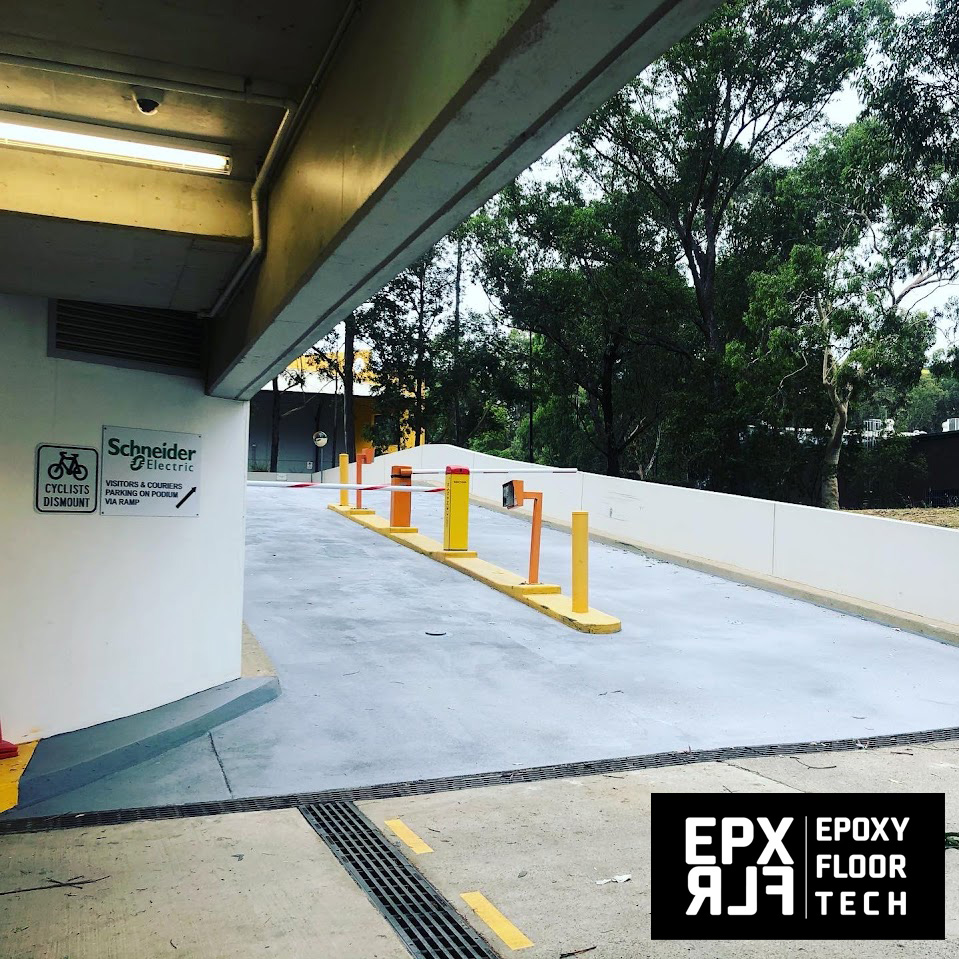Introduction
In Australia, “falls are the leading cause of injury hospitalisation and death, representing 43% of injury hospitalisations and 42% of injury deaths”; based on the information from the Australian Institute of Health and Welfare.
This alarming number shows very clearly why every public and private business MUST make sure that all its floors are non-slip, especially if there is a chance of the presence of water and/or oil. So, epoxy floors for commercial kitchens can have all the elements of a complete disaster if not applied correctly. Ramps and steps make the situation even worse.
What is non-slip epoxy flooring?
Non-slip epoxy flooring (also called anti-slip or slip-resistant epoxy flooring) is a special type of epoxy coating system designed to improve traction and reduce the risk of slips and falls—especially in environments where the floor often gets wet, oily, or greasy, like commercial kitchens, workshops, warehouses, and garages.
Find our ultimate guide on epoxy flooring here. It contains tons of data on epoxy floorings, their origin, different aspects of it, and much more.
Here’s a detailed breakdown 👇
Definition and Composition
Non-slip epoxy flooring starts with a standard epoxy resin system (a two-part mixture of resin and hardener that chemically cures into a hard, seamless surface).
What makes it non-slip is the addition of textured aggregates—materials that create microscopic or visible roughness across the surface. Common aggregates include:
- Silica sand or quartz — fine, durable grains for medium traction.
- Aluminium oxide — very hard and sharp, ideal for heavy-duty or industrial areas.
- Polypropylene or glass beads — smoother, for light to moderate slip resistance.
- Rubber or plastic flakes — add traction and a decorative look in some applications.
These aggregates are broadcast (sprinkled) onto the wet epoxy basecoat and then sealed with a topcoat to lock them in place.
How It Works
When you walk across a smooth epoxy floor, your shoes have minimal friction—great for cleaning, but slippery when wet.
By adding texture, non-slip epoxy increases surface friction, giving footwear more grip even in the presence of liquids.
The coarseness of the texture can be customised:
- Fine texture → for light-duty areas that must remain easy to clean (e.g., hospital corridors, cafés).
- Medium texture → for commercial kitchens, workshops, or garages.
- Coarse texture → for industrial or outdoor ramps and wet zones.
Where It’s Used
Non-slip epoxy flooring is widely used in environments where safety and hygiene must coexist:
- Commercial kitchens and food preparation areas
- Restaurant dishwashing and service zones
- Workshops and mechanical garages
- Warehouses and factories
- Breweries, dairies, and cold storage rooms
- Hospitals and healthcare facilities
Advantages
- Slip-resistance: Meets Australian Standards (AS/NZS 4586) for pedestrian surface slip ratings.
- Durability: Withstands forklifts, heavy equipment, and foot traffic.
- Chemical resistance: Safe against oils, acids, detergents, and cleaning agents.
- Hygienic: Seamless, non-porous, and easy to clean.
- Customisable: Multiple colours, textures, and finishes available.
- Long lifespan: Often lasts 10–20 years with minimal maintenance.
Installation Overview
- Concrete preparation — grinding or shot-blasting to remove contaminants.
- Primer coat — ensures proper adhesion.
- Base coat of epoxy — provides structure and binds to substrate.
- Aggregate broadcast — sand, quartz, or aluminium oxide scattered evenly.
- Sealer/topcoat — encapsulates the texture, adds gloss or matte finish.
Maintenance
Despite its texture, non-slip epoxy remains easy to maintain:
- Sweep daily to remove debris.
- Mop using a neutral cleaner (avoid strong acids or alkalis).
- For coarse surfaces, use a soft scrub brush to remove buildup.
- Reapply topcoat every few years if gloss or grip reduces.
In Summary
Non-slip epoxy flooring is a textured, seamless epoxy coating designed to enhance safety without compromising hygiene or durability.
It’s one of the most practical solutions for facilities that face wet or greasy conditions, combining industrial strength with compliance to safety standards and a clean, professional appearance.
Anti-Slip Floors: Australian Rules & Regulations
As per the Australian rules and regulations, the Australian Building Code and the Australian Standard for Slip Resistance (AS 4586 and AS 4663) specify which slip ratings are required and which tests can be conducted:
• Wet pendulum (P rating test)
• Oil wet inclining platform (R rating test)
As indicated in Australian Standard for slip test methods AS 4586:2013 (for new surfaces) and AS 4663:2013 (for existing surfaces), the wet pendulum test method (P rating) should be used in all situation where surfaces can get wet and are accessed barefoot and/or with shoes.

Why Choose Epoxy Floor Tech to Install Your Non-Slip Concrete Flooring
At Epoxy Floor Tech, we have many years of experience in providing high-quality epoxy coating for concrete floors for all kinds of businesses in Sydney and regional NSW.
We offer expert advice on the best preparation method for your non-slip epoxy floor, should it be P3, P4, or P5, or should you go ahead with R11-R13 ratings, and which product is most suitable for application.
We offer various resinous flooring options, including non-slip epoxy flooring, Polyurethane Cement Flooring, Crack Bridging trafficable Polyurethane floorings, MMA floorings, and ultra-tough solutions such as Hybrid Polyurea flooring.
Moreover, we have all these various flooring options in food-grade flooring, extreme chemical resistance, fire-rated, self-extinguishing, or even as an anti-static floor (ESD).

Find Out More About Non-Slip Epoxy Concrete Coating
We have a reputation for providing non-slip epoxy concrete coating in Sydney that is second to none. Our innovative solutions, attention to detail, and superior customer service ensure that our customers are always satisfied with their Sydney epoxy flooring projects. We are completely committed to producing work of the highest possible standard, but if we know that something can’t be done, we will be open and honest with you.